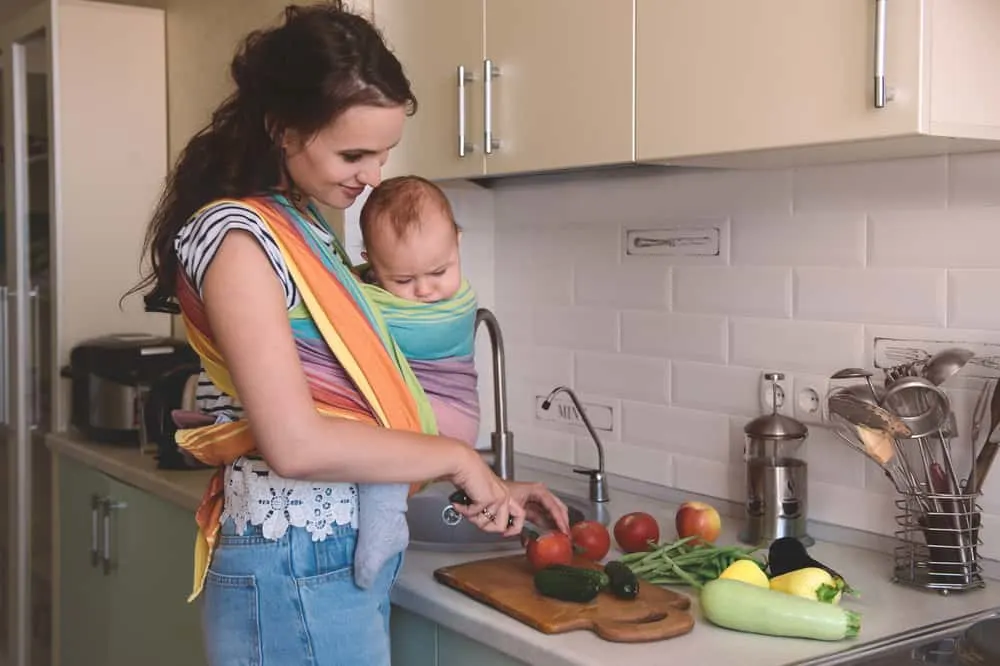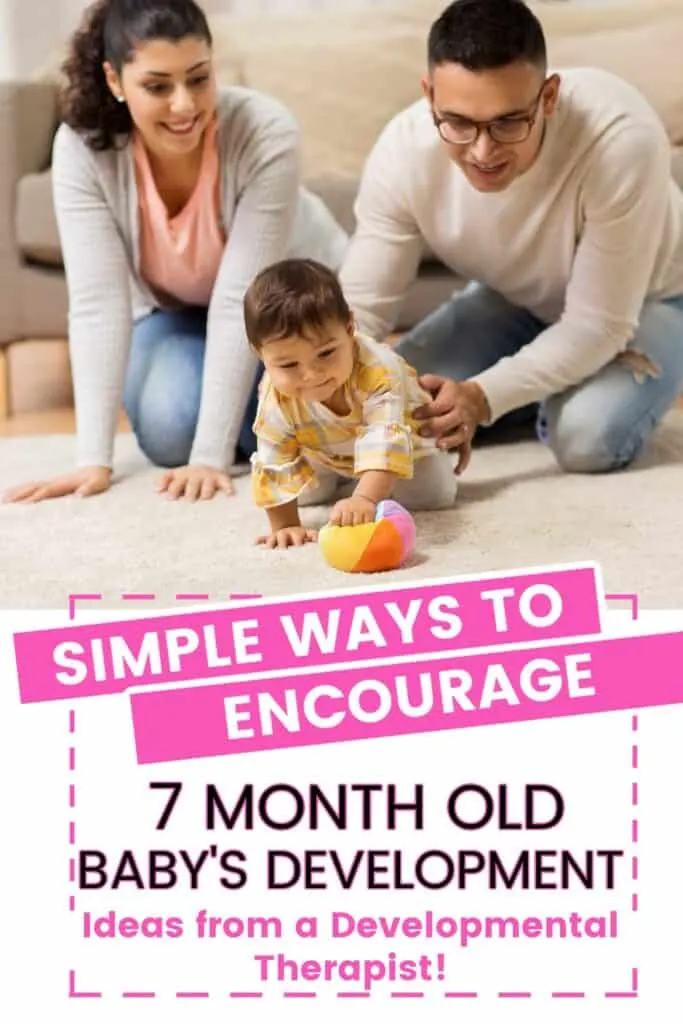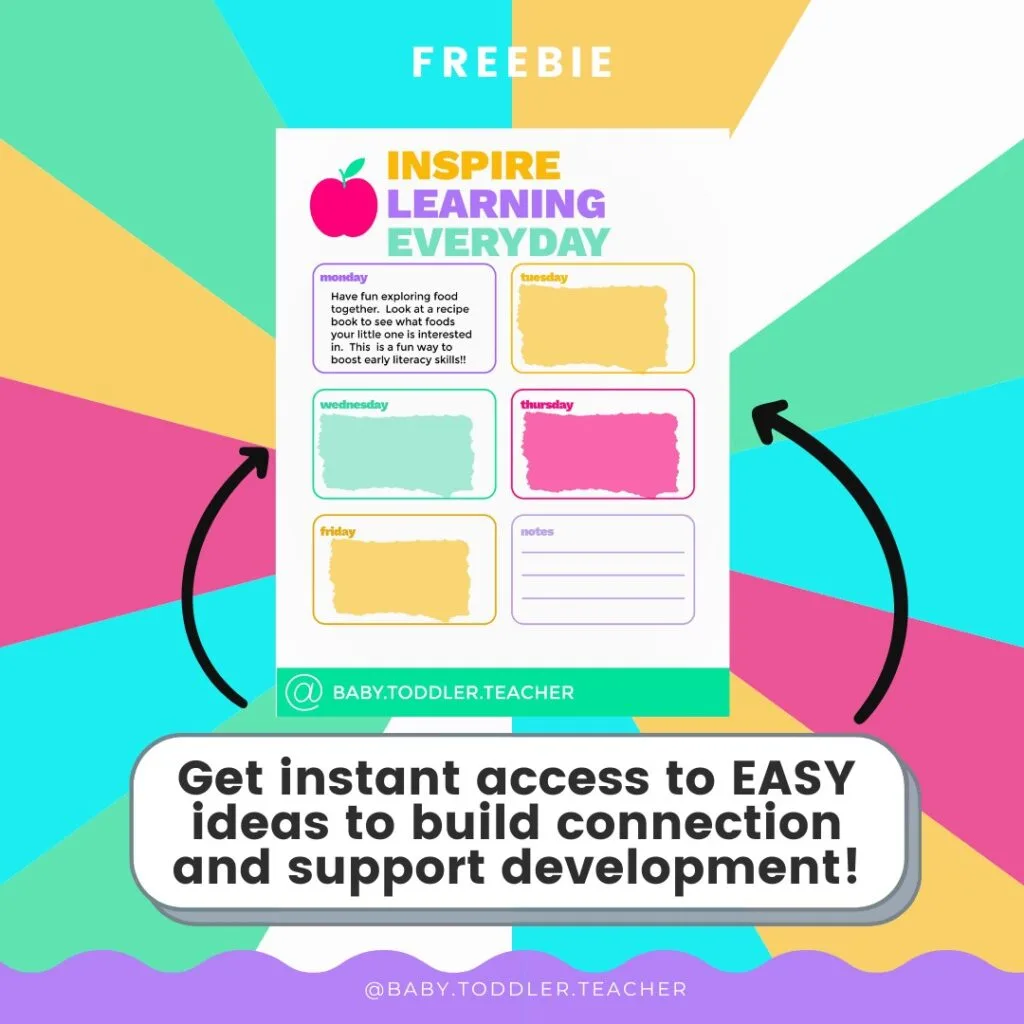Your baby is now 7 Months Old!
Experiencing the journey with your 7-month-old baby is an exciting part of parenthood.
As a new mommy or daddy, each day is a new adventure filled with milestones and discoveries.
In this blog post, we’re delving into how playtime and everyday routines are a great way to support your little one’s growth in crucial areas.
Through simple activities, you can actively foster their language skills, aid cognitive development, encourage gross motor skills, and nurture emotional development.
Embrace this vibrant phase of your baby’s life and watch them flourish as we guide you through practical strategies and fun ideas to enhance this formative stage of your child’s journey.

(This post may contain affiliate links. To read our full disclosure policy click here.)
Exploring the Milestones at the 7-Month Mark
As your baby reaches the 7-month-old mark, you’ll notice remarkable changes in their mobility and engagement with the world.
This is a pivotal time for baby’s development where they’re typically working on:
- Cognitive Development: Your little one’s brain is making huge leaps in understanding cause and effect, memory, and problem-solving.
- Language Development: Babbling becomes more varied and complex, and they may start to imitate sounds which is the foundation for future communication skills.
- Muscle Strength: At this age, many babies are experimenting with moving forwards and backwards, often getting ready to crawl which involves a complex coordination of muscle strength and cognitive skills.
- Fine Motor Skills: Watch as your baby begins to grasp objects with more purpose and attempts to move them from one hand to another.
Now let’s explore some fun activities that you can do in your daily routine that are excellent ways to support your 7-month-old baby.

Simplifying Learning with Everyday Tasks
Incorporating learning into daily routines is genuinely one of the best ways to encourage your baby’s development.
This method is far from cumbersome for you as parents and offers your child abundant opportunities for repetitive practice – the key to mastering new skills.
For instance, turning laundry time into a new sensory experience can be surprisingly effective.
Imagine your baby’s delight as they reach into the laundry basket, feel different textures, and explore vibrant colors.
They’re not just playing; they’re learning about their world through sensory play.
Another everyday routine ripe for learning is paying attention to the sounds around us.
Even the simplest noise, like the birds chirping or the subtle hum of the dishwasher, can become a live symphony to your little one’s ears, exposing them to a variety of different sounds.
This is more than entertainment; it’s a prime way to enhance their listening skills, an essential component of language development.
Water play during bath time offers a fun-filled sensory play experience, helping in developing problem-solving skills as they splash and discover cause and effect.
Narrating your actions and introducing baby sign language while dressing or during mealtime can foster social skills and early communication.
Lastly, don’t forget the power of music and nursery rhymes, which not only soothe but aid in memory formation and language acquisition but can also be embedded to almost any daily routine.
Each routine task is an opportunity to engage and teach, making the most of these moments sets the foundation for a lifetime of learning.
I have done all the work for you and laid out exactly how to do this with your baby HERE.

Grab your FREE Milestone Guide HERE.
Setting Up a Stimulating Play Environment for Your Baby
Playtime is more than just a fun activity for your little one—it is a crucial aspect of their learning and development journey.
Setting up a play area that is both safe and stimulating can make a world of difference in nurturing your baby’s curiosity.
Start by choosing baby toys that grab your child’s attention and encourage exploration.
Then, by strategically placing toys just out of reach, you entice your baby to engage in problem-solving, a fantastic way to boost their cognitive skills.
During tummy time, place your baby’s favorite toys in front of them to encourage forward movement.
You can even create a simple “baby obstacle course” with pillows and soft toys to create a playful challenge.
This not only supports physical development but also sharpens their communication skills as they express their delight and determination.
Meanwhile, showing your baby different ways to interact with their toys—squeezing a soft toy to make a sound, for instance—provides them with valuable learning experiences.
Your demonstrative play serves as an accessible model, ready for your baby to mimic and learn from.
Remember, incorporating fun activities into your everyday routine, like an impromptu puppet show with their favorite toys, not only brings endless giggles but also paves the way for dynamic learning experiences.
Read with Your Baby
Cultivating a Love of Learning: Read with Your Baby
Initiating storytime with your bundle of joy is more than just a great time; it’s a gateway to stimulating your baby’s development across numerous domains.
When you read with your baby, you foster new skills such as hand-eye coordination, as they learn to turn the pages; you introduce new words that pave the way for early language acquisition; and you lay the groundwork for lifelong literacy skills.
- Follow Your Baby’s Lead: Pay attention to how your baby responds to reading. If they seem intrigued by a particular picture or love the rhythmic cadence of a certain story, let these cues guide your book choices. It’s important to make reading an enjoyable activity that captivates your baby’s attention.
- Select Engaging Books: Choose sturdy, board books with high-contrast images and interactive elements. This will withstand your little explorer’s hands-on approach and provide a tactile dimension to their learning. You can even make books a playful time by adding small toys to story time.
- Independent Exploration: Having books available within reach allows your baby to explore them solo. This independent play is a fun way for babies to become familiar with books, even if it means they chew on the corners sometimes.
Encouraging your baby to take an active role during reading primes them for a lifetime of learning and exploration.
Sit with them, show them how to turn the pages gently, and point out vivid pictures to catch their eye.
As they grow, these storytime sessions become a foundational practice that not only enriches their minds but also strengthens your parent-child bond.
You can see some of my favorite books for babies here.
Cherishing Milestones in Your Baby’s First Year
As we reflect on the transformative journey through your baby’s first year, reaching the 7-month mark heralds a significant developmental stage packed with discovery and growth.
By incorporating some of these simple activities into your daily routines, you empower your baby’s developmental strides in a playful and nurturing environment.
From the sensory-rich exploration of laundry time to encourage cognitive abilities set by a baby-friendly obstacle course to the foundational language skills nurtured during storytime, each activity is a stepping stone towards a fulfilling learning continuum.
Remember that reading, playing, and exploring together are not merely tasks to check off a list, but opportunities brimming with potential at every turn, guiding your little one through their unique developmental journey.
Related Posts You Will Enjoy
The Best Fine Motor Toys for Babies
When do babies start standing?
Why You Should Avoid Baby Walkers and What to Do Instead!
The Best Baby Floor Mats for Crawling


Kayla O’Neill has a master’s degree in education as well as a bachelor’s degree in special education with an emphasis in early childhood education. She has been working as a developmental therapist with babies and toddlers in early intervention since 2012. She is also a mom with two young children.
